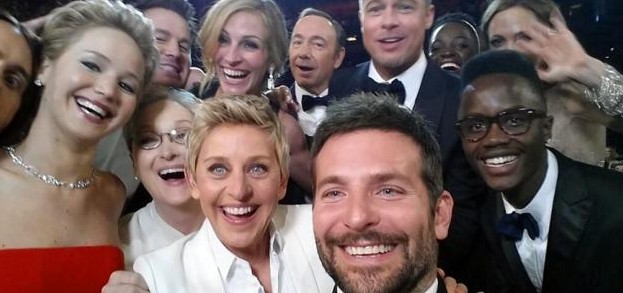What were the Oscar scriptwriters thinking?? 0
In addition to the actual awards, those of you who watched the Oscars this past Sunday night will no doubt remember the pizza, the selfie that crashed Twitter, and a few good acceptance speeches (think Jared Leto, Matthew McConaughey, Lupita Nyong’o and Cate Blanchett). And then there was John Travolta, butchering Idina Menzel’s name…
It wasn’t the most lively or entertaining Oscar night by a long shot – and while people have been commenting that Ellen DeGeneres didn’t seem on top of her game that night – I think the real reason lies with the scriptwriters for the presenters.
I mean, really! Have you ever heard such stilted, unnatural language? I know the presenters are actors, and are used to reading lines, but the scripts they were given were written for fancy print; not meant to be spoken.
I can’t find examples on YouTube, but I can recall the type of language the actors were forced to read, over and over, throughout the long evening:
“Real life and cinematic skill combine gracefully in the ebb and flow of superb documentary production, as evidenced by the amazing nominees in the short documentary category.” [This is not what they actually said, but it’s absolutely in the same vein.]
C’mon!! Even if this were meant to be read instead of spoken, it wouldn’t pass a high school English teacher’s purple prose meter. And the entire evening was like this.
When you have people speaking, the words they’re given have to be written for speech. It’s that simple! If the presenters had been given better material, they would have been less stiff and the whole proceedings would have been lighter and more fun.
The same goes for you when you’re putting a talk together. Don’t write anything down word for word until AFTER you know what you want to say. And it’s best if you never write it down word for word at all. Just keep saying it, and giving yourself one or two word hints on paper if you need help. If you’re not sure if something is right, just say, “In other words…” What you say after that is going to be better.
I used to work as a public radio producer, and one of our jobs was to make sure that the anchor never sounded like he or she was reading a script when introducing a story, even though s/he always was. It meant writing the story lead-in exactly the way the anchor would say it. One summer I worked on Morning Edition at NPR, when Bob Edwards was still the host. There was a row of small editing booths near the studio, and early one morning I walked by as all the production assistants and assistant producers were preparing lead-ins for the stories. Every one of them was sitting there with a stopwatch, doing his or her best Bob Edwards imitation to make sure that when he read the script, it would sound just like ordinary speech. It was pretty funny hearing them all, but absolutely necessary to have him sound conversational.
If only the Oscar scriptwriters had done the same!
 Facebook
Facebook Twitter
Twitter
